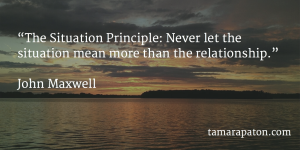

In last week’s post, I detailed the research-backed benefits that motivate my mindfulness practice. I’m thrilled (and a little relieved) to hear how this opportunity resonated with so many readers. In this post, I respond to the questions that came through to me loud and clear. How do I bring this to my board work? And how can I open my mind to this without my brain falling out?
Purists would instruct you to abandon reality for a short time and head to an ashram. If you can swing 10 days of mountaintop silence, go for it. I’m envious of you already and you haven’t even booked your flight.
A more accessible introduction to mindfulness is available to all of us. It begins in the form of small choices in everyday life. You need as little as one minute each day. (If you can’t isolate that single minute, we have other issues to tackle.)
There are countless resources available to help you become more mindful. As a start, here is a Mindfulness 101 introduction. Beyond that, the wide range of resources could easily overwhelm you. Here are some of my favourites to get you started.
Mindfulness apps
My go-to app is 10% Happier. Although there are plenty of other great mindfulness apps out there (e.g., Headspace, Insight Timer, and Calm), 10% Happier knits together video courses focused on technique with guided meditations. It even pings my phone to remind me to meditate each day.
Podcasts, books and blogs
I discovered the 10% Happier app by way of ABC news anchor Dan Harris’ book of the same name. In his memoir, Harris details how mindfulness helped him restore his mental health and recover from drug addiction. The podcast continues the conversation, leveraging the journalist’s rolodex to interview meditators from the arts, politics, science and business. He also shares several guided meditation tracks, so you get a mix of the “how” and “why” behind the practice.
I also recommend the Becoming Wise podcast. Host Krista interviews great thinkers like author Elie Wiesel, US Congressman John Lewis, and mindfulness researcher Jon Kabat-Zinn. Hearing inspiring leaders talk about mindfulness keeps me motivated and consistent in my own practice.
For something with more structure, consider online programs. These can range from an 8-week course in Mindfulness Based Stress Reduction to a single webinar from acclaimed teachers as the Spirit Rock Meditation Centre.
Meditation studios and retreats
I knew that mindfulness had gone mainstream when venture capitalists started funding meditation studios. New Yorkers are flocking to MNDFL and Inscape. LA has Unplug and DC residents gather at Just Meditate, Recharj and Take Five.
For now, Canadians need to look a little harder. Our options include meditation classes at a local yoga studio or more academic options like The Centre for Mindfulness Studies and the Search Inside Yourself program at the Rotman School of Management.
If you are really concerned about mindfulness’ “woo-woo” potential, consider executive coach Peter Bregman’s leadership training. He has written extensively about mindfulness in Harvard Business Review (here, here and here) and approaches the practice in the broader context of leadership development.
Those who prefer full immersion may be interested in residential training and retreats. Good options include the Insight Meditation Society and the Kripalu Center. If you like a little luxury with your mindfulness, consider the Grail Springs Retreat Centre. I’m also a fan of Jeff Warren, a Toronto-based author and meditation teacher who leads a variety of retreats.
Whatever resource you try, I hope you find your own way of becoming more mindful. Doing so has allowed me to focus for hours in board meetings. Being fully present helps me observe the interpersonal dynamics and body language that escape others. And it helps me respond, rather than react, to stressful situations that are part of every board experience.
Thank you for reading! If you found this post useful, please share it with others in your network. Doing so helps my work reach others and would mean so much to me.








